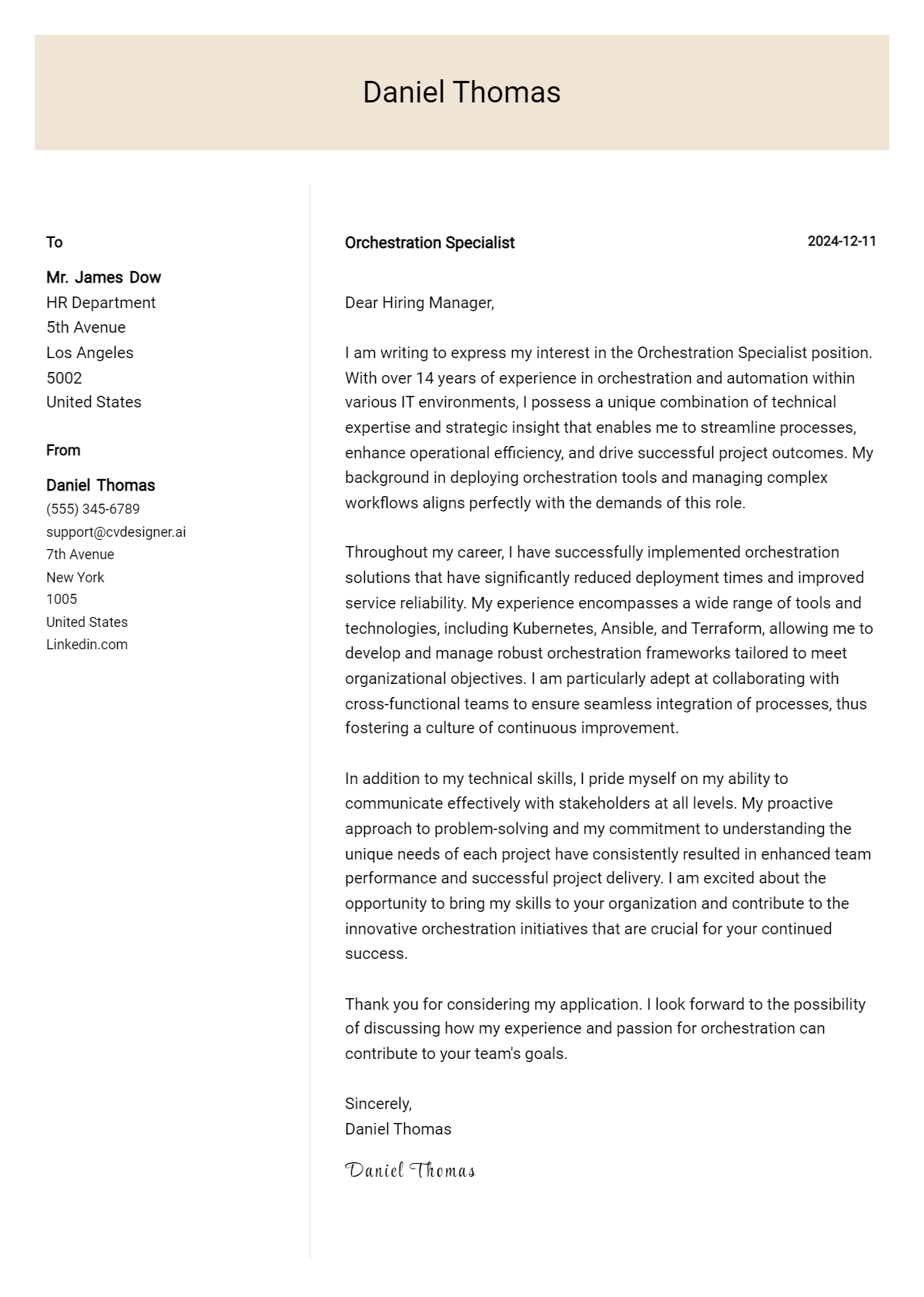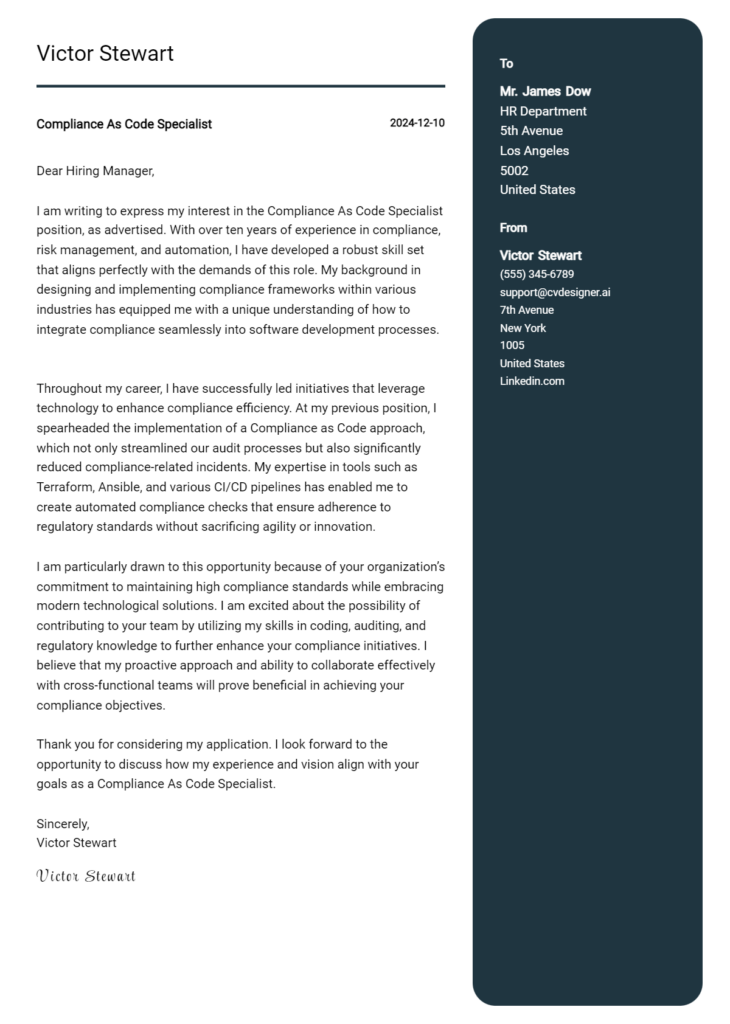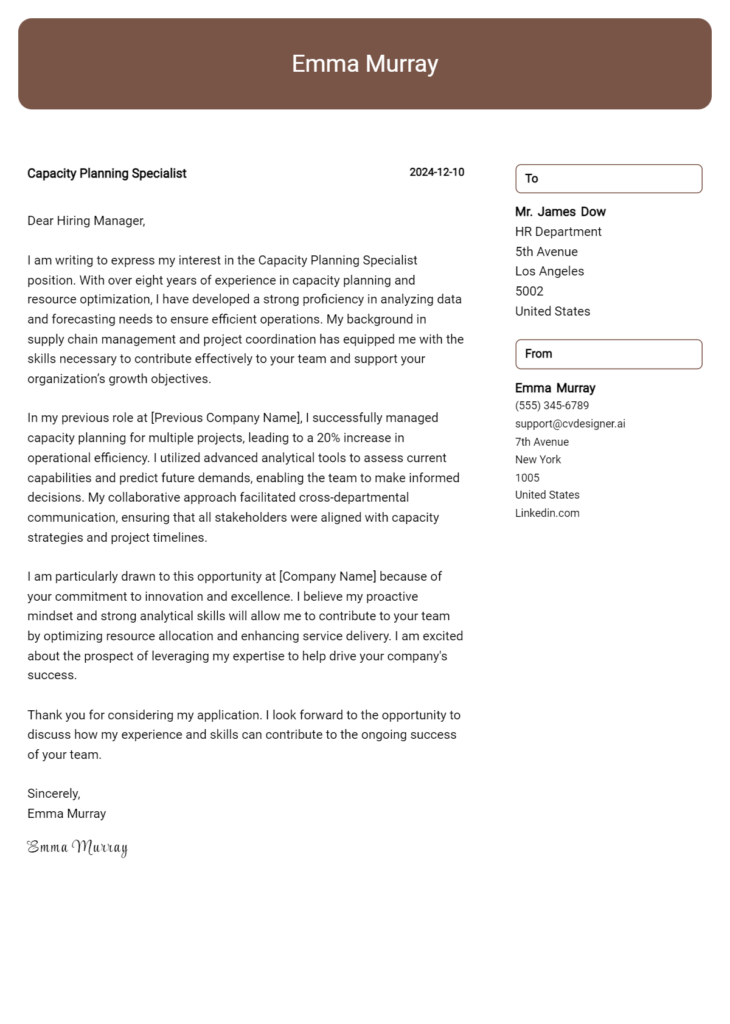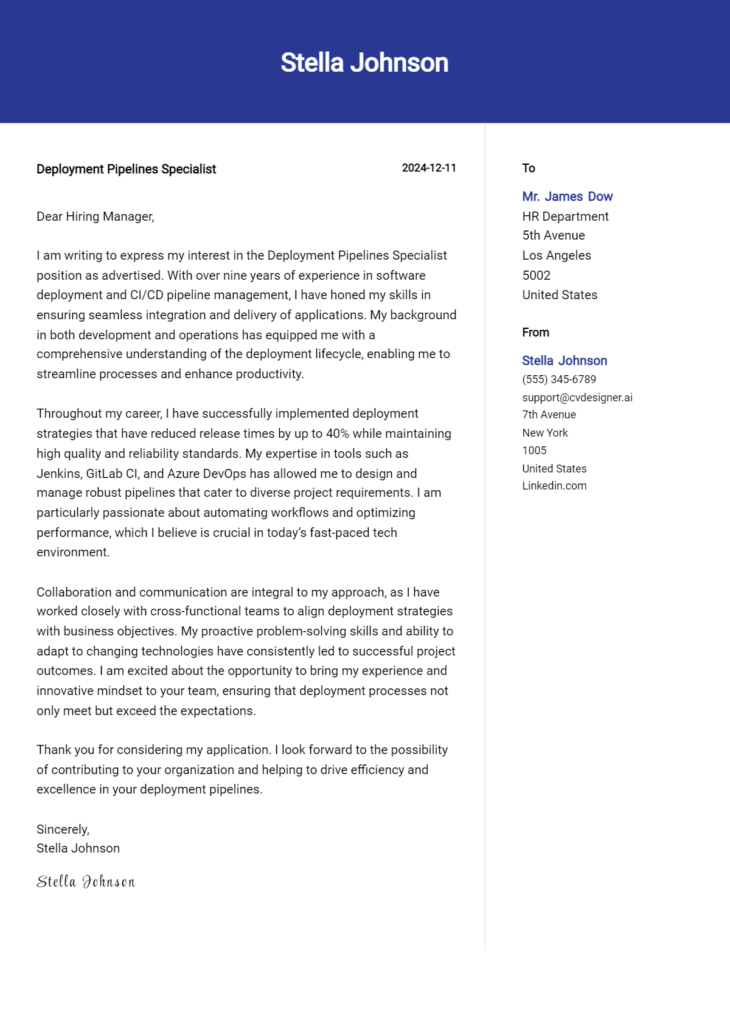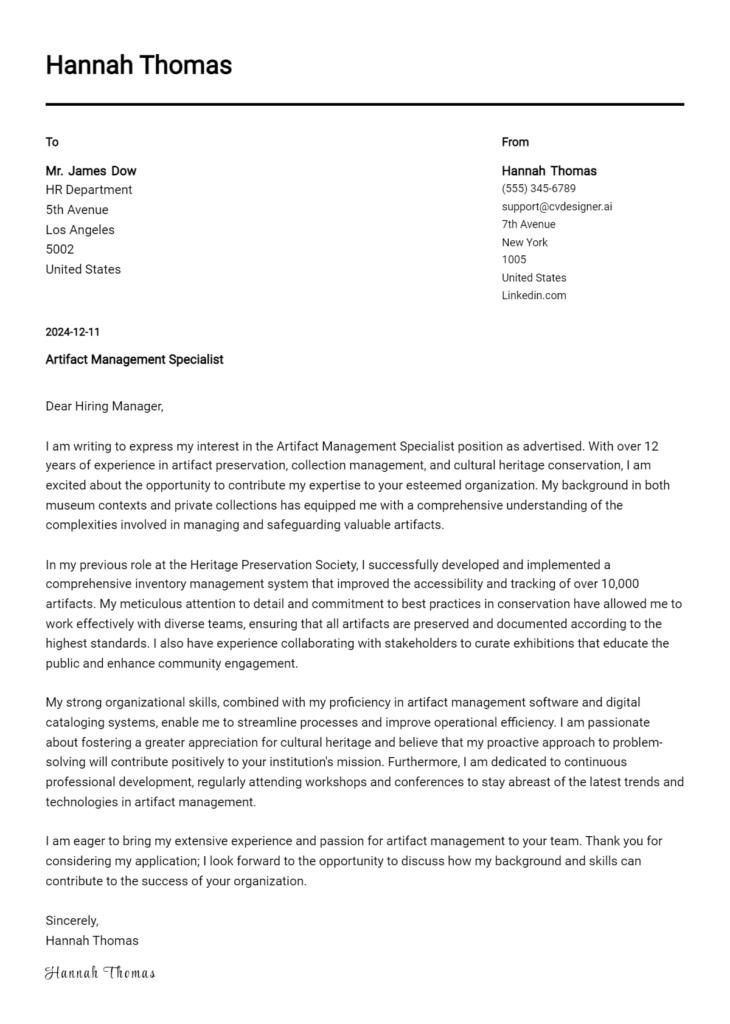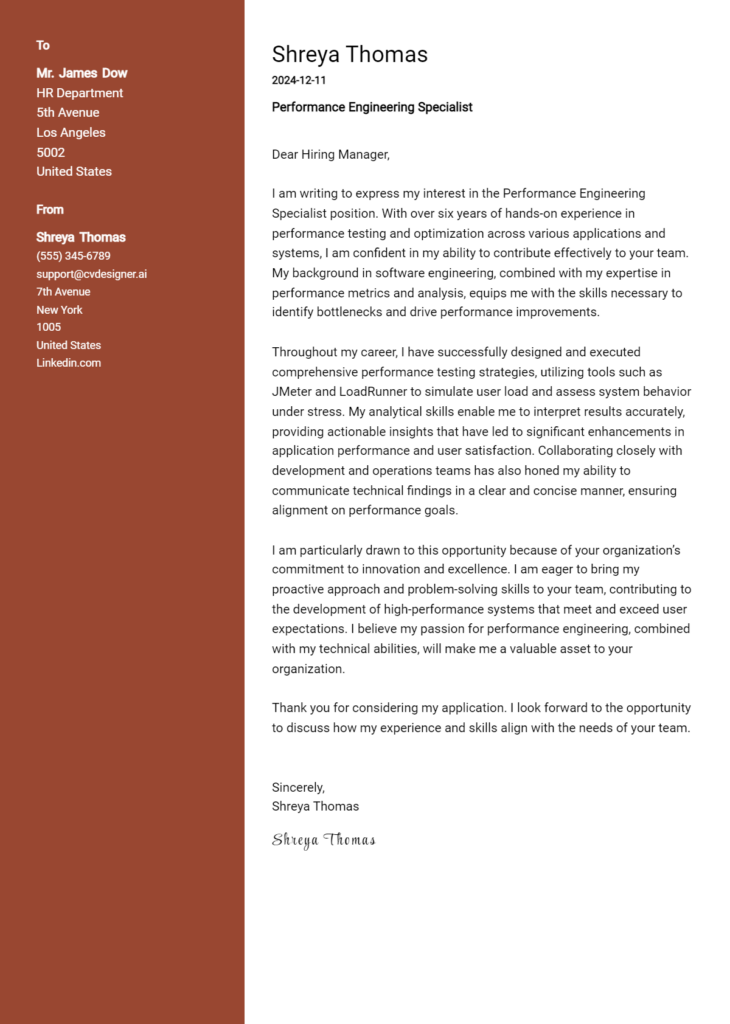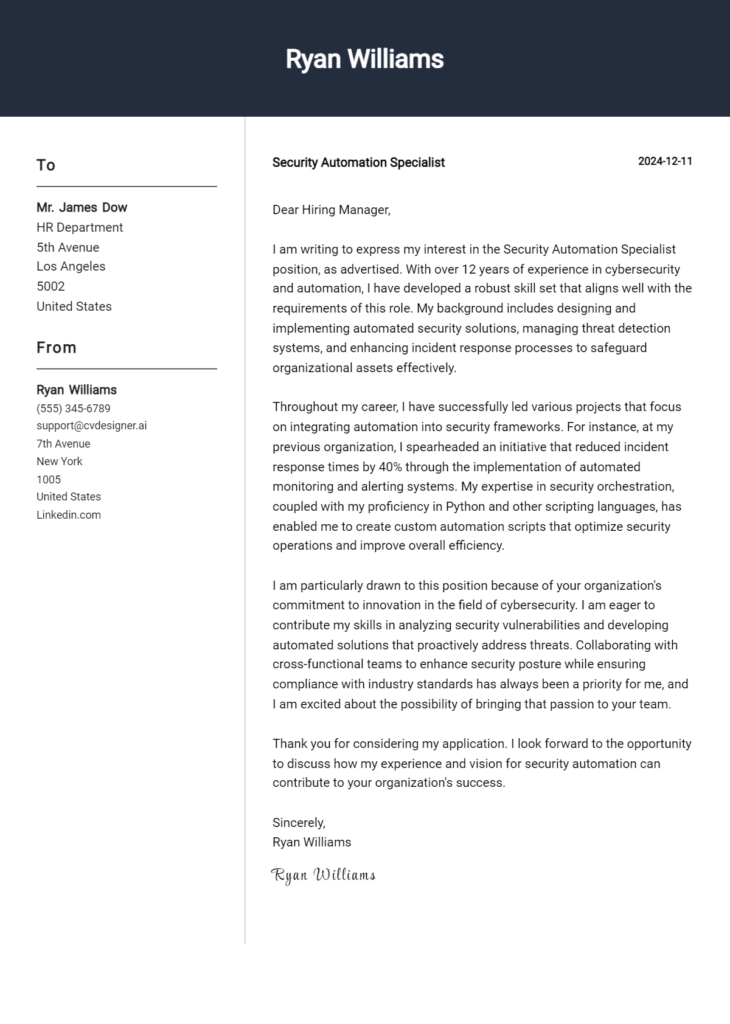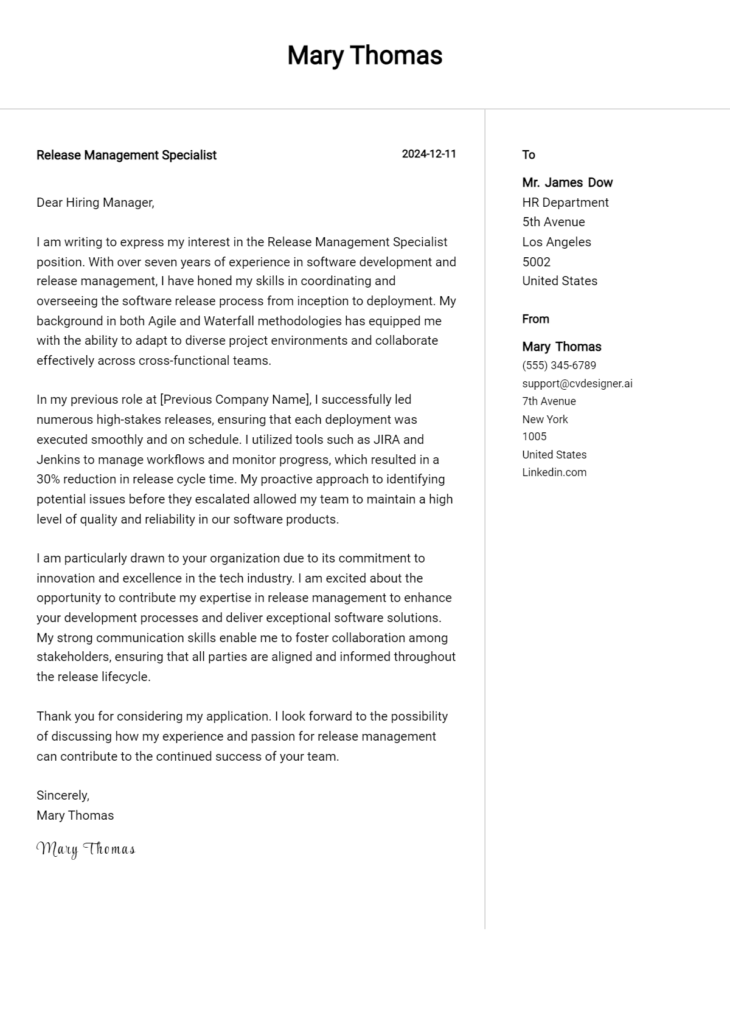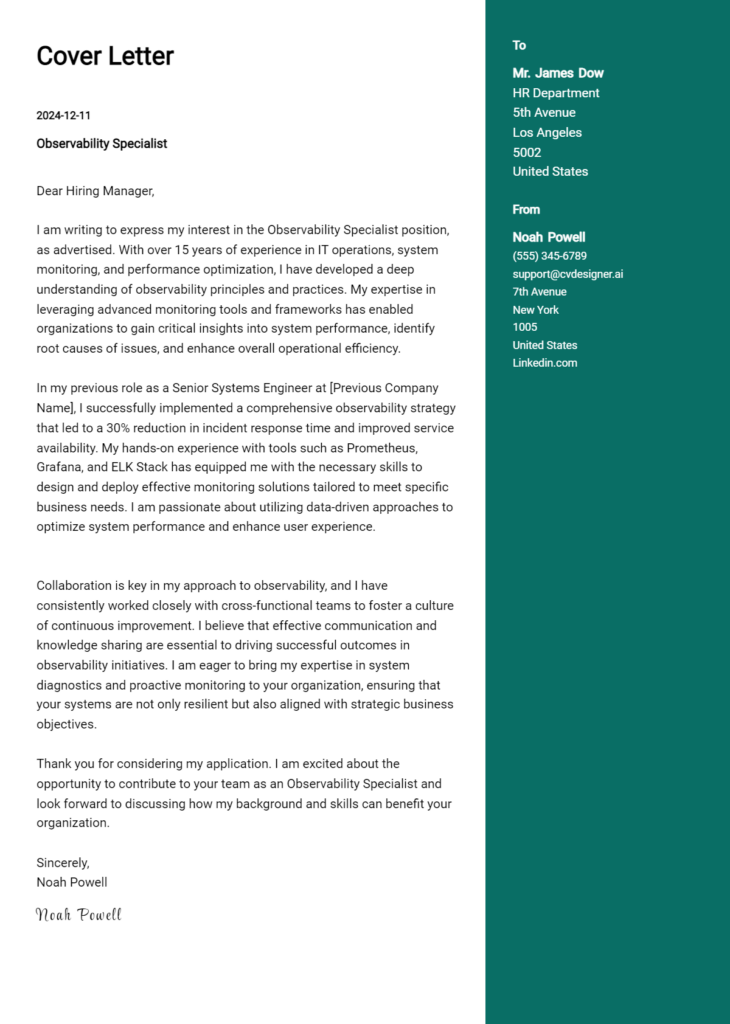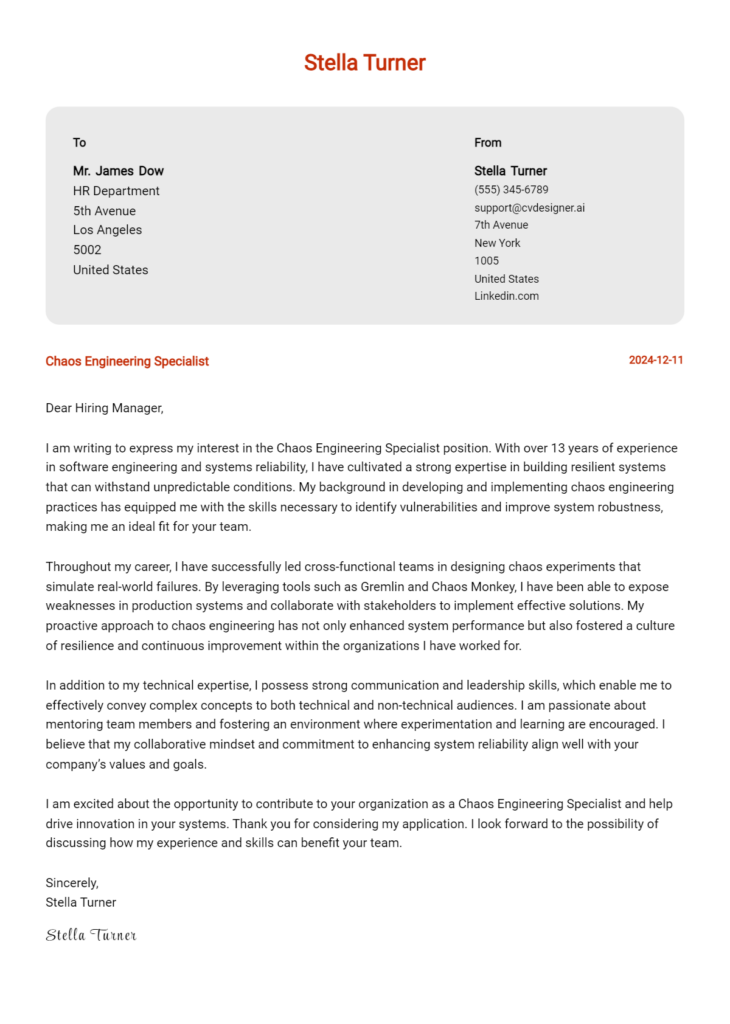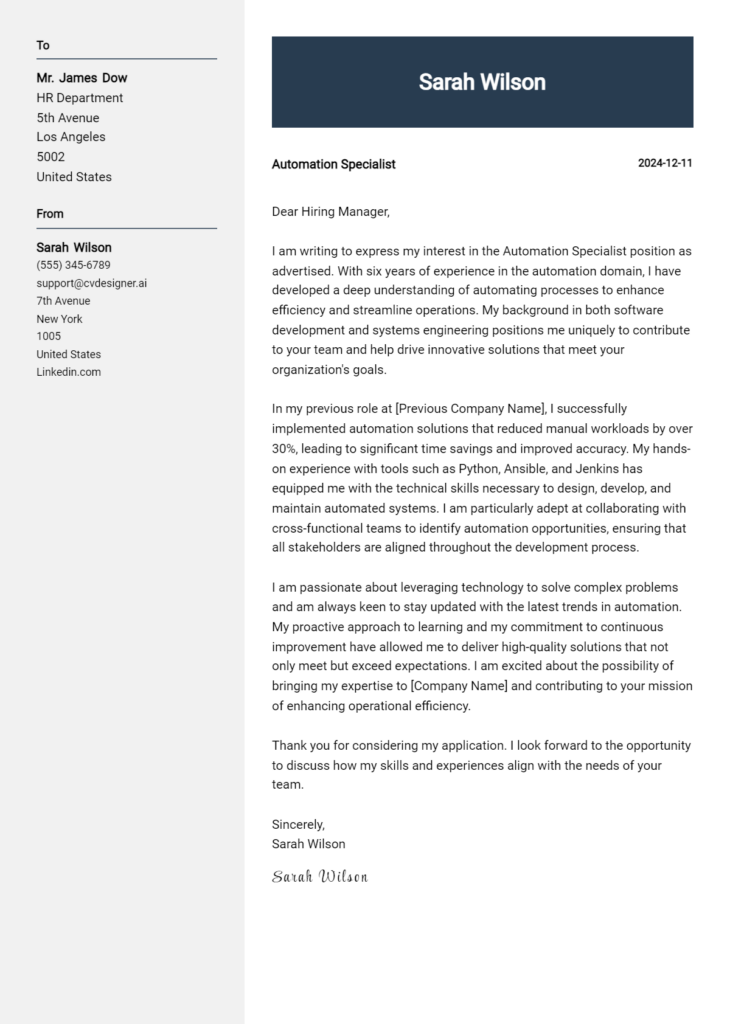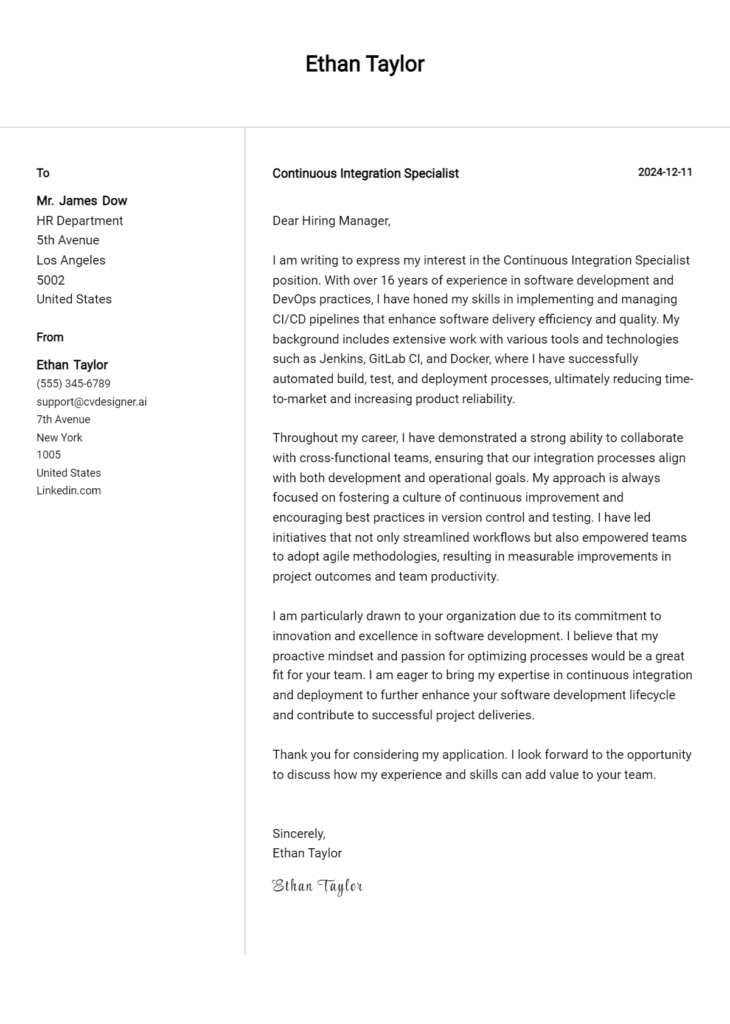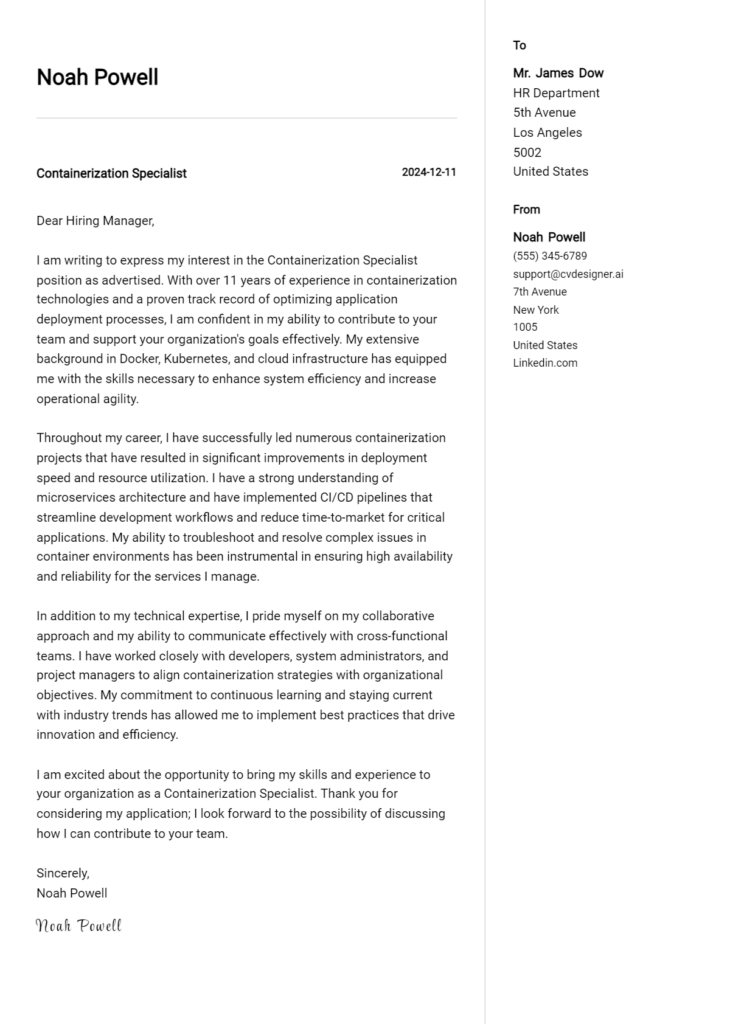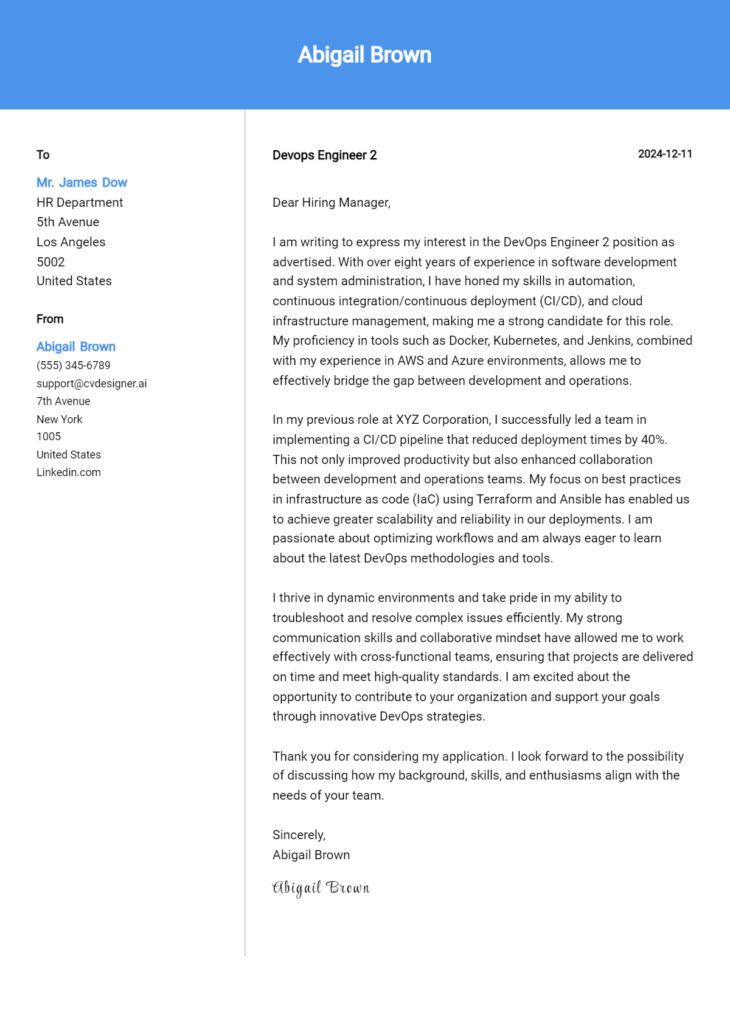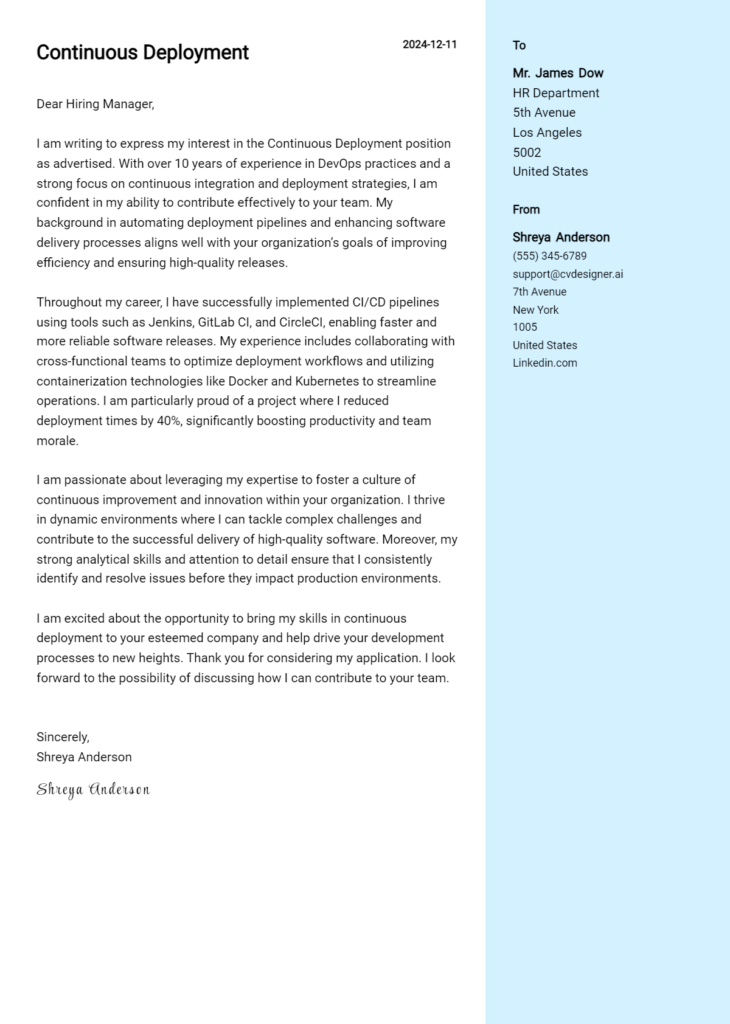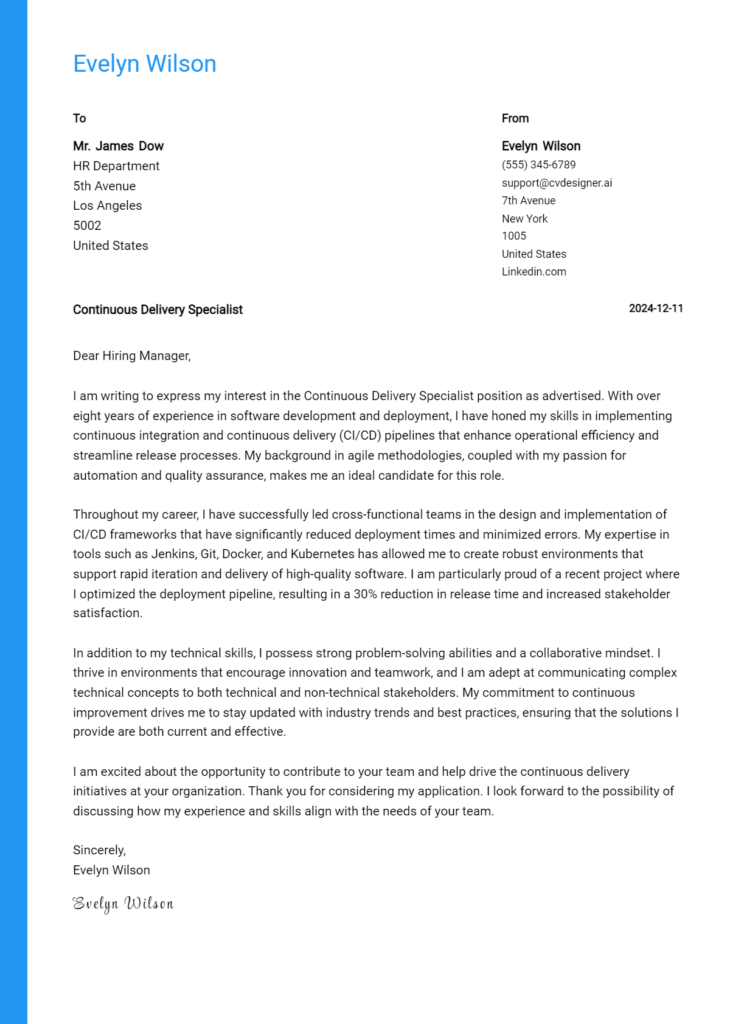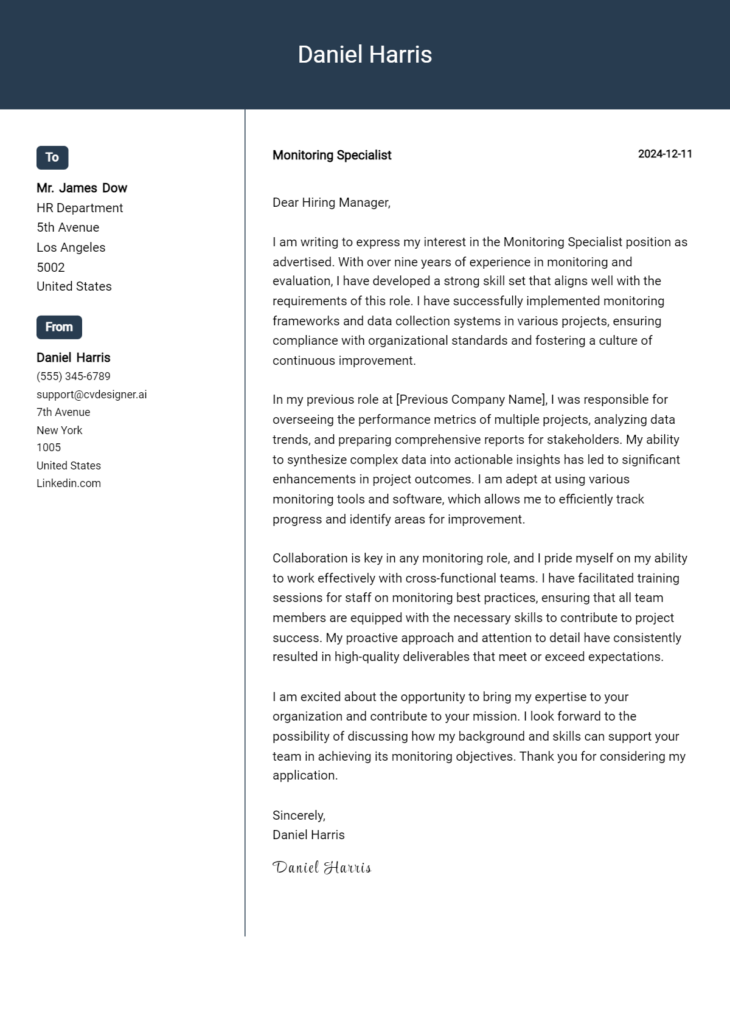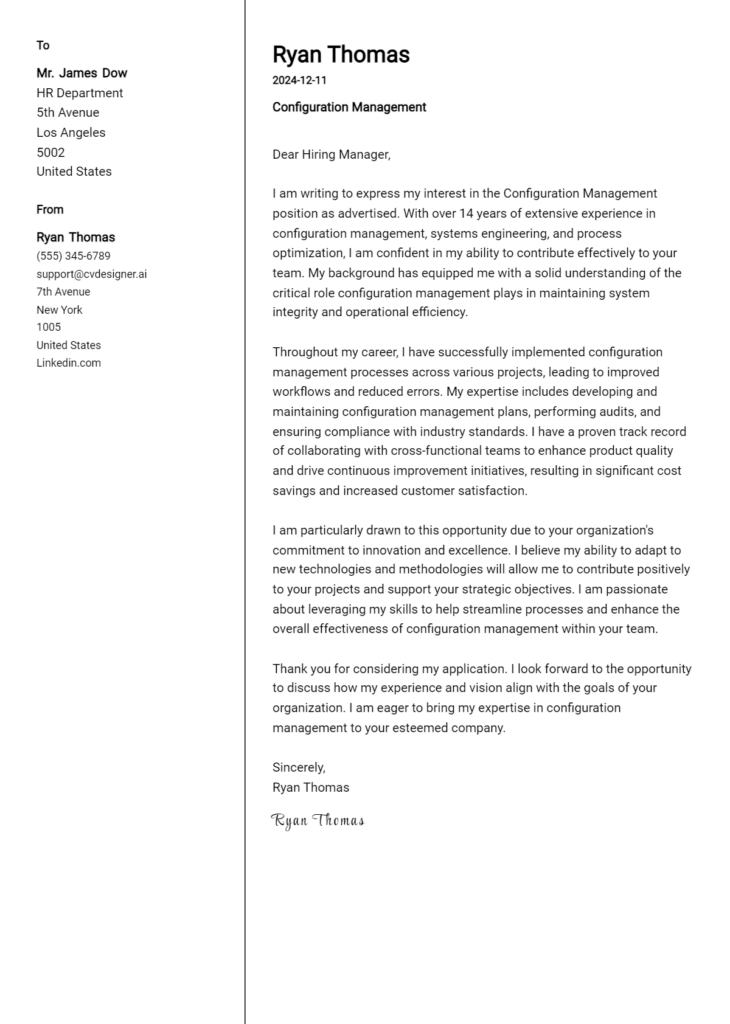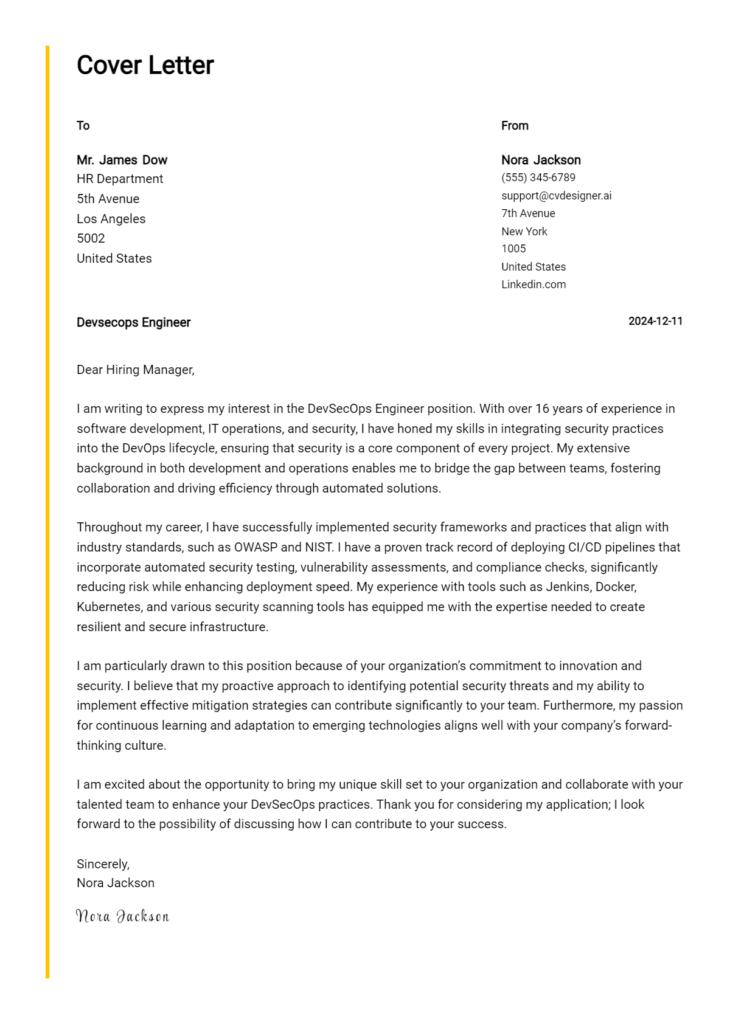Orchestration Specialist Cover Letter Examples
Explore additional Orchestration Specialist cover letter samples and guides and see what works for your level of experience or role.
How to Format an Orchestration Specialist Cover Letter?
Crafting a compelling cover letter is essential for an Orchestration Specialist, as it not only showcases your technical expertise but also demonstrates your ability to manage complex processes and coordinate multiple tasks. Proper formatting is crucial in this role, as it reflects your organizational skills and attention to detail—qualities that are vital in orchestration and process management. A well-structured cover letter will capture the hiring manager's attention and convey your professionalism, making it easier for them to see how your skills align with the needs of their team.
In this guide, we'll outline how to structure your cover letter effectively, providing insights and examples tailored for an Orchestration Specialist.
We'll focus on the essential components of a professional cover letter, including:
- Cover Letter Header
- Cover Letter Greeting
- Cover Letter Introduction
- Cover Letter Body
- Cover Letter Closing
Each section plays a pivotal role in highlighting your qualifications and ensuring your application stands out in a competitive job market. Let’s break down each part and discuss how to elevate your orchestration cover letter.
Importance of the Cover Letter Header for an Orchestration Specialist
A well-crafted cover letter header is essential for any job application, including for the role of an Orchestration Specialist. It serves as the first impression and sets the tone for the rest of the document. A clear and professional header ensures that your contact information is easily accessible to the hiring manager, which can facilitate communication during the hiring process. A typical header should include your name, address, phone number, email, the date, and the recipient's name and title, along with the company name and address. By prioritizing clarity and professionalism, you demonstrate your attention to detail and commitment to the role.
Strong Example
John Doe 123 Main St City, State, ZIP (123) 456-7890 johndoe@email.com October 10, 2023 Hiring Manager XYZ Company 456 Business Rd City, State, ZIP
Weak Example
john doe city, state johndoe@email 10/10/23 xyz company
Importance of the Cover Letter Greeting
The cover letter greeting serves as the first impression you make on the hiring manager and sets the tone for the rest of your application. A well-crafted greeting demonstrates professionalism and shows that you have taken the time to personalize your correspondence. By directly addressing the hiring manager by name, you establish a connection that can make your letter stand out among the competition. To avoid generic greetings that may come off as impersonal, it's essential to do your research and find out the recipient's name. If the name is not available, consider using a more specific title instead of "To Whom It May Concern."
Here are some strong and weak examples of greetings for a cover letter for an Orchestration Specialist position:
Strong Example
Dear Ms. Johnson,
Weak Example
To Whom It May Concern,
The Importance of a Well-Crafted Cover Letter Introduction for an Orchestration Specialist
A well-crafted cover letter introduction is crucial for an Orchestration Specialist, as it serves as the first impression to the hiring manager. This opening paragraph should not only capture their attention but also convey the candidate's enthusiasm for the role. Additionally, a strong introduction briefly highlights key skills or achievements relevant to orchestration, setting a positive tone for the rest of the letter. A compelling introduction can differentiate a candidate from the competition and encourage the hiring manager to read further, while a weak one may lead to a missed opportunity.
Strong Example
Dear [Hiring Manager's Name], As a passionate Orchestration Specialist with over five years of experience in streamlining complex processes and enhancing operational efficiency, I am excited to apply for the position at [Company Name]. My track record includes successfully implementing orchestration solutions that have reduced deployment times by 30% and improved service reliability, making me confident in my ability to contribute to your team and drive impactful results.
Weak Example
To Whom It May Concern, I am writing to apply for the Orchestration Specialist position. I have some experience in orchestration and think I might be a good fit for the job. I hope you will consider my application.
Purpose of the Cover Letter Body for an Orchestration Specialist
The body of a cover letter for an Orchestration Specialist serves as a critical platform for candidates to articulate their unique qualifications and the value they can bring to the organization. This section should highlight the candidate's relevant skills, experiences, and notable achievements in orchestration projects. By showcasing specific examples, such as successful deployments, automation initiatives, or process optimization efforts, the candidate can demonstrate their technical prowess and problem-solving capabilities. A well-crafted body not only reflects the candidate's understanding of orchestration tools and methodologies but also aligns their contributions with the goals of the prospective employer, thereby enhancing their chances of securing an interview.
Strong Example
Dear [Hiring Manager's Name], I am excited to apply for the Orchestration Specialist position at [Company Name]. In my previous role at [Previous Company Name], I successfully led a project that implemented an automated deployment pipeline using Kubernetes and Jenkins, which reduced our deployment time by 40%. This initiative not only streamlined our operations but also significantly decreased the likelihood of human error during the deployment process. Furthermore, I collaborated with cross-functional teams to integrate monitoring solutions that provided real-time insights into our application performance, leading to a 25% improvement in system reliability. My hands-on experience with orchestration tools such as Docker, Terraform, and Ansible equips me to bring immediate value to [Company Name], and I am eager to contribute to your mission of enhancing operational efficiency. Sincerely, [Your Name]
Weak Example
Dear [Hiring Manager's Name], I am writing to apply for the Orchestration Specialist position. I have some experience with orchestration tools and have worked on a few projects. I think I would be a good fit for the job. I am familiar with Kubernetes and Ansible, but I haven't used them extensively. I hope to bring my skills to your company and learn more about orchestration. Thank you, [Your Name]
Importance of the Cover Letter Closing for an Orchestration Specialist
The closing paragraph of a cover letter serves as the final opportunity to leave a lasting impression on the hiring manager. For an Orchestration Specialist, it is crucial to summarize key qualifications, reiterate enthusiasm for the role, and prompt the next steps in the hiring process. A strong closing can enhance the overall effectiveness of the application, while a weak one may undermine the candidate's chances. Here are examples of both:
Strong Example
Thank you for considering my application for the Orchestration Specialist position. With my extensive experience in automating complex workflows and optimizing orchestration processes, I am excited about the opportunity to contribute to your team at [Company Name]. I look forward to the possibility of discussing my qualifications further and how I can help drive efficiency and innovation within your organization. Please feel free to reach out to schedule an interview at your earliest convenience. Thank you once again for your time and consideration.
Weak Example
I hope you like my application. I think I'm okay for the Orchestration Specialist job. If you want to talk more, you can look at my resume. Let me know what you think.
Crafting an effective cover letter for the role of an Orchestration Specialist is crucial in showcasing your qualifications and differentiating yourself from other candidates. This position demands a unique blend of technical expertise, problem-solving skills, and a solid understanding of the Software Development Life Cycle (SDLC), alongside a collaborative spirit and a commitment to continuous learning. By following these tips, you can create a compelling cover letter that highlights these essential attributes and captures the attention of potential employers.
Tips for Writing a Cover Letter as an Orchestration Specialist
Highlight Technical Skills: Begin your cover letter by emphasizing your technical proficiency in orchestration tools and technologies. Mention specific platforms you are familiar with, such as Kubernetes, Docker, or Jenkins. Use examples from your previous work to illustrate how you utilized these tools to streamline processes and improve efficiency.
Showcase Problem-Solving Abilities: Employers value candidates who can tackle challenges effectively. Describe a relevant scenario where you identified a problem in an orchestration process and successfully implemented a solution. This not only demonstrates your analytical skills but also your ability to think critically under pressure.
Demonstrate SDLC Knowledge: As an Orchestration Specialist, understanding the Software Development Life Cycle is essential. Discuss your experience with various phases of the SDLC and how you have contributed to improving workflows. This can include your involvement in planning, development, testing, and deployment stages, emphasizing your holistic view of the software development process.
Emphasize Teamwork and Collaboration: Orchestration often involves working closely with cross-functional teams. Share examples of how you have collaborated with developers, DevOps, and QA teams to achieve common goals. Highlight your interpersonal skills and how they have led to successful project outcomes, reinforcing your value as a team player.
Convey Passion for Continuous Learning: The tech field is ever-evolving, and a passion for ongoing education is crucial for an Orchestration Specialist. Mention any recent certifications, training, or personal projects that reflect your commitment to staying current with industry trends and technologies. This will signal to employers that you are proactive about your professional development.
For further assistance in crafting your cover letter, consider using our cover letter templates or our user-friendly cover letter builder. These resources can provide you with the structure and guidance needed to create a standout cover letter tailored for the Orchestration Specialist role.
Common Mistakes to Avoid in a Orchestration Specialist Cover Letter
Crafting a compelling cover letter is vital for standing out as an Orchestration Specialist. Avoiding common mistakes can significantly enhance your chances of landing an interview. Here are some pitfalls to watch out for:
- Generic Opening: Starting with a bland greeting can make your letter forgettable. Personalize it by addressing the hiring manager by name when possible.
- Lack of Focus: Wandering off-topic can dilute your message. Stay focused on your orchestration skills and experience relevant to the job description.
- Ignoring the Job Description: Failing to align your cover letter with the specific requirements of the role can be detrimental. Use keywords from the job posting to demonstrate your fit.
- Overly Complex Language: Using jargon or overly elaborate sentences can confuse the reader. Aim for clarity and conciseness to convey your qualifications effectively.
- Neglecting Formatting: A poorly formatted cover letter can detract from your professionalism. Ensure you follow an appropriate cover letter format to enhance readability.
- Not Showcasing Achievements: Merely listing duties without highlighting accomplishments can weaken your application. Use specific examples to showcase your contributions and successes in previous roles.
- Typos and Grammatical Errors: Simple mistakes can undermine your credibility. Always proofread your letter or use tools to catch errors before submitting.
For inspiration, explore various cover letter examples that cater specifically to orchestration roles to guide your writing process.
Cover Letter FAQs for Orchestration Specialist
What should I include in my cover letter for an Orchestration Specialist position?
In your cover letter, highlight your technical expertise in orchestration tools and platforms, such as Kubernetes, Docker, or Apache Airflow. Discuss your experience in automating workflows, managing cloud environments, and integrating various services. Be sure to mention specific projects where you successfully implemented orchestration solutions that led to improved efficiency or reduced downtime. Additionally, emphasize your problem-solving skills and ability to work in a collaborative environment, as orchestration often involves cross-functional teams. Tailor your cover letter to the job description, showcasing how your skills align with the company's needs.
How can I demonstrate my technical skills in my cover letter?
To effectively demonstrate your technical skills in your cover letter, provide concrete examples of past projects or tasks where you applied your orchestration knowledge. Mention specific technologies or frameworks you have utilized and the outcomes of those projects. For instance, you could describe a situation where you automated a complex deployment process or improved system reliability through orchestration. Use metrics or data to quantify your achievements, such as reduced deployment times or increased uptime. This will not only highlight your skills but also show your ability to drive results in a tangible way.
Should I include soft skills in my cover letter?
Yes, including soft skills in your cover letter is essential, especially for an Orchestration Specialist role. While technical expertise is crucial, soft skills such as communication, teamwork, and adaptability are equally important. Orchestration often requires collaboration with various teams, so demonstrating your ability to communicate complex technical concepts to non-technical stakeholders can set you apart. Additionally, highlight your problem-solving approach and how you adapt to changing technologies and methodologies. Use examples to illustrate these skills, such as leading a team through a challenging project or mentoring junior staff in orchestration practices.
How can I make my cover letter stand out from others?
To make your cover letter stand out, focus on personalizing it to the specific company and role. Research the organization's culture, values, and recent projects, and reflect this understanding in your letter. Start with a compelling opening that captures the reader's attention, perhaps by sharing your passion for orchestration or a relevant anecdote. Use a clear and professional format, and keep your language focused and concise. Additionally, include unique contributions you can make to the team, such as innovative ideas or proven strategies that align with the company's goals. Ending with a strong closing statement that reiterates your enthusiasm will also leave a lasting impression.
Build your Cover Letter in minutes
Use an AI-powered cover letter builder and have your letter done in 5 minutes. Just select your template and our software will guide you through the process.

